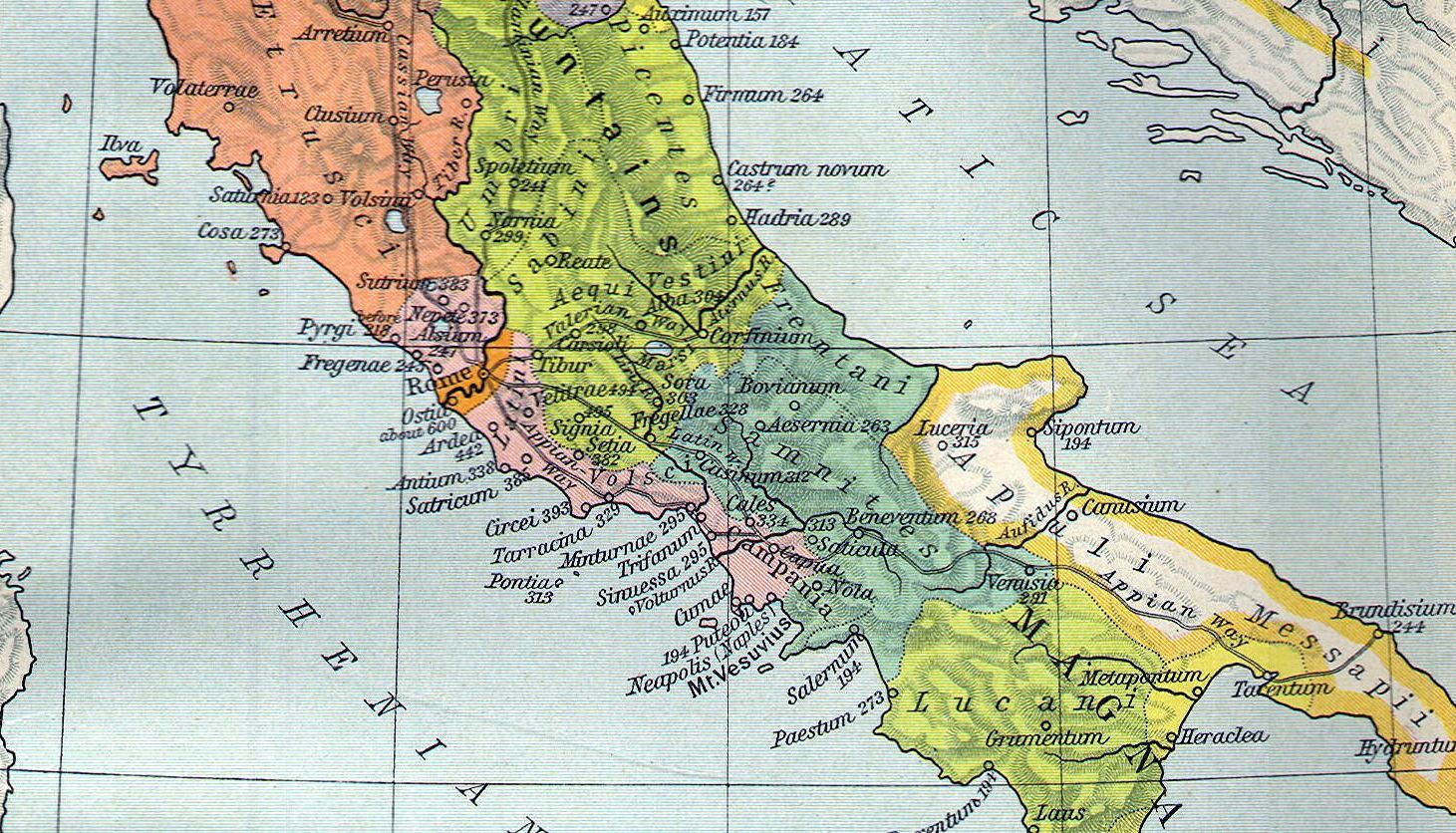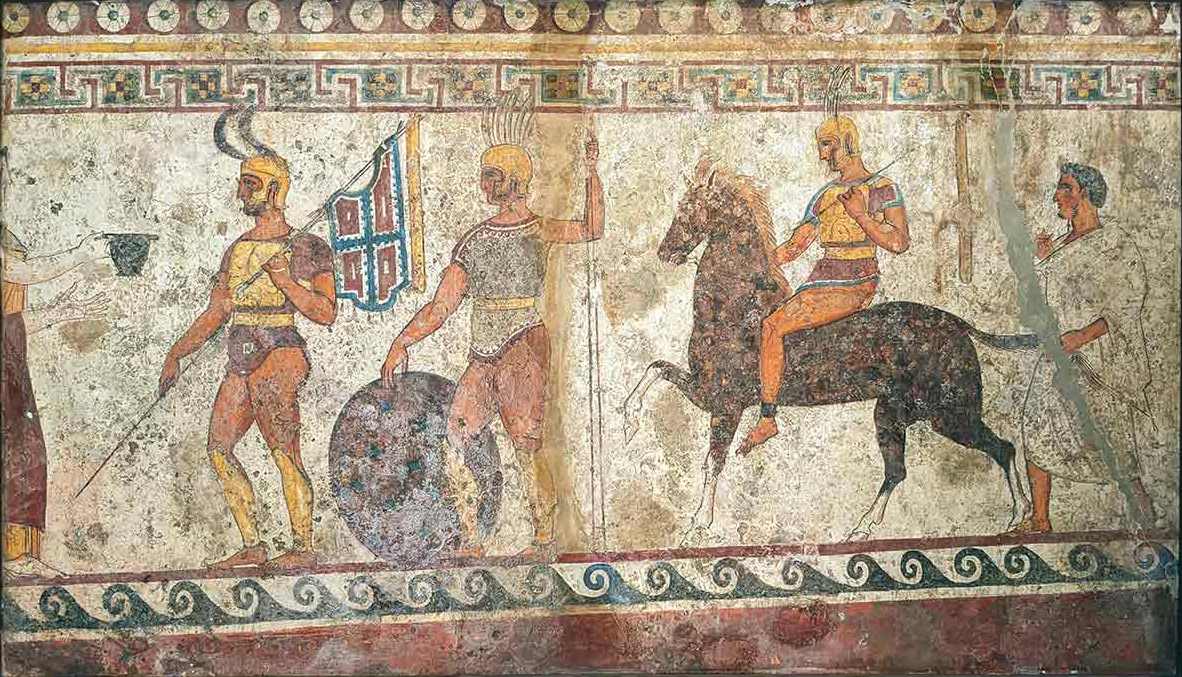THE LECHERY OF LAETORIUS, CA. 312 BC
Presented here are the three sources for the story of the otherwise unknown Roman military tribune M. Laetorius Mergus, who fled and killed himself before being condemned to death for having tried to rape his adolescent adjutant.
The date can be guessed. Dionysios places the story within a chapter immediately preceding the outbreak of the Third Samnite War in 298 BC, besides saying the next incident he relates happened a few years earlier than that concerning Laetorius and after the military disaster of the Caudine Forks in 321 BC. Moreover, military tribunes began to be elected rather than appointed almost certainly in 311 BC (Livy, From the Founding of the City IX 30 iii-iv) and Dionysios makes a point of remarking that Laetorius had been appointed, which has led to reasonable speculation that some lost Roman writing may have recounted this story as an explanation of why the Romans wished to elect tribunes.[1]

Dionysios of Halikarnassos, Roman Antiquities XVI 4
The Ῥωμαϊκὴ Ἀρχαιολογία Roman Antiquities by Dionysios of Halikarnassos in Caria, a history of Rome down to 264 BC, was written to inform Greeks and is the most important surviving source for early Roman history apart from Livy. Publication began in 7 BC. The translation is by Earnest Cary for the Loeb Classical Library volume 388, published by the Harvard University Press in 1950.
| One more political incident I shall relate, [says Dionysius], deserving of praise on the part of all men, from which it will be clear to the Greeks how great was the hatred of wrongdoing felt in Rome at that time and how implacable the anger against those who transgressed the universal laws of human nature. Gaius Laetorius, with the cognomen Mergus, a man of distinguished birth and not without bravery in warlike deeds, who had been appointed tribune of one of the legions in the Samnite war, attempted for a time to persuade a youth[2] of exceptional beauty among his tentmates to put the charms of his body at his disposal voluntarily; then, when the boy was not to be lured either by gifts or by any other friendly overture, Laetorius, unable to restrain his passion, attempted to use force. When the man’s disgraceful conduct had become noised throughout the entire camp, the tribunes of the people, holding that it was a crime against the whole state, brought an indictment against him publicly, and the people unanimously condemned him, after fixing death as the penalty; for they were unwilling that persons who were of free condition and were fighting in behalf of the freedom of their fellow citizens should be subjected by those in positions of command to abuses that are irreparable and do violence to the male’s natural instincts.[3] | [4 i] [Ὅτι, φησὶ Διονύσιος,] μιᾶς ἔτι μνησθήσομαι πράξεως πολιτικῆς ἀξίας ὑπὸ πάντων ἀνθρώπων ἐπαινεῖσθαι, ἐξ ἧς καταφανὲς ἔσται τοῖς Ἕλλησιν ὅσον ἦν τὸ μισοπόνηρον ἐν τῇ Ῥώμῃ τότε καὶ τὸ πρὸς τοὺς παραβαίνοντας τὰ κοινὰ νόμιμα τῆς ἀνθρωπίνης φύσεως ἀμείλικτον. [ii] Γάιος Λαιτώριος Μέργος ἐπίκλησιν ἐπιφανὴς κατὰ γένος καὶ κατὰ τὰς πολεμικὰς πράξεις οὐκ ἀγεννής, ἑνὸς τῶν ταγμάτων χιλίαρχος ἀποδειχθεὶς ἐν τῷ Σαυνιτικῷ πολέμῳ, νεανίαν τινὰ τῶν ὁμοσκήνων διαφέροντα τὴν ὄψιν ἑτέρων μέχρι μέν τινος ἔπειθεν ἑαυτῷ χαρίσασθαι τὴν τοῦ σώματος ὥραν ἑκόντα· ὡς δ᾿ οὔτε δωρεαῖς οὔτ᾿ ἄλλῃ φιλανθρωπίᾳ τὸ μειράκιον ἡλίσκετο, κατέχειν τὴν ἐπιθυμίαν ἀδύνατος ὢν βίαν προσφέρειν ἐπεβάλετο. [iii] περιβοήτου δὲ τῆς ἀκοσμίας τοῦ ἀνδρὸς ἅπασι τοῖς ἐπὶ τοῦ στρατοπέδου γενομένης κοινὸν ἀδίκημα τῆς πόλεως εἶναι νομίσαντες οἱ δήμαρχοι γραφὴν ἀποφέρουσι κατ᾿ αὐτοῦ δημοσίᾳ· καὶ ὁ δῆμος ἁπάσαις ταῖς ψήφοις τοῦ ἀνδρὸς κατέγνω τίμημα δίκης ὁρίσας θάνατον, οὐκ ἀξιῶν εἰς ἐλεύθερα σώματα καὶ προπολεμοῦντα τῆς τῶν ἄλλων ἐλευθερίας τοὺς ἐν ταῖς ἀρχαῖς ὄντας ὑβρίζειν τὰς ἀνηκέστους καὶ παρὰ φύσιν τοῖς ἄρρεσιν ὕβρεις. |

Valerius Maximus, Memorable Doings and Sayings VI 1 ix
The following reference to the story comes in a list of stupra, attempted or successful seductions or rapes of freeborn Roman boys, maidens or wives that make up a section entitled “Of Chastity”. It is the second of three examples he gives of the punishment of military officers for sex with ordinary young soldiers.
Valerius compiled his books of anecdotes during the reign of Tiberius (AD 14-37). The translation is by D. R. Shackleton Bailey in the Loeb Classical Library volume CCCCXCIII (Cambridge, Massachusetts, 2000).
| To the punishment of a lustful Centurion succeeds the equally ignominious end of Military Tribune M. Laetorius Mergus. Tribune of the Plebs Cominius summoned him to trial before the people for having tried to seduce his adjutant. Laetorius could not bear his conscience in the matter, and before the trial date penalized himself, first by flight and then by suicide as well. He had fulfilled the limit of punishment, but after death was nonetheless convicted of unchastity by vote of the whole people. The military standards, the sacred eagles, and the severe discipline of the camp, that surest guardian of Roman empire, pursued him even to the underworld, since he had tried to become corrupter of the purity of one of whose valour he should have been preceptor. | [xi] Libidinosi centurionis supplicium M. Laetorii Mergi tribuni militaris aeque [similis] foedus exitus sequitur. cui Cominius tribunus plebis diem ad populum dixit quod cornicularium suum stupri causa appellasset. nec sustinuit eius rei conscientiam Laetorius sed se ipse ante iudicii tempus fuga prius, deinde etiam morte punivit poenae modum expleverat, fato tamen functus universae plebis sententia crimine impudicitiae damnatus est. signa illum militaria, sacratae aquilae, et certissima Romani imperii custos, severa castrorum disciplina, ad inferos usque persecuta est, quoniam cuius virtutis magister esse debuerat, sanctitatis corruptor temptarat exsistere. |

The Souda was a 10th-century Byzantine encyclopaedia of the ancient world based on ancient sources, but with some later interpolations. The translation is by Jennifer Benedict in the online edition at http://www.stoa.org/sol/. The passage presented here follows immediately one describing the condemnation of Laetorius a military tribune who tried to rape a youth under his command:
|
Gaius Laetorius Cognomen Marcus.[4] The Romans’ hatred of knavery and their lack of mercy towards those who trespass the common values and customs of human nature are illustrated by this man. For he was appointed tribunus militum in the Samnite war and up to a certain point he tried to persuade a certain youth among his tentmates who surpassed the others in appearance to willingly let him enjoy the beauty of his body, but since the youth was not won by gifts nor by any other friendliness, [Laetorius], unable to restrain his desire, made an attempt to use force. When the disorderly conduct of this man became well-known among all in the encampment, the tribunes [of the plebs], considering it to be a crime against the state in common, brought an indictment against him in public, and the people by unanimous vote condemned him, having determined the punishment for the crime [to be] death, not considering it proper that those who are in command should do violence to free people fighting for the freedom of others with outrages which are irreparable and contrary to the nature of males. |
Γάϊος Λαυτώριος Μάρκος ἐπίκλησιν. ἐκ τούτου δείκνυται τὸ μισοπόνηρον τω̂ν ̔Ρωμαίων καὶ τὸ πρὸς τοὺς παραβαίνοντας τὰ κοινὰ καὶ νόμιμα τη̂ς ἀνθρωπίνης φύσεως ἀμείλικτον. οὑ̂τος γὰρ χιλίαρχος ἀποδειχθεὶς ἐν τῳ̂ Σαυιτικῳ̂ πολέμῳ νεανίαν τινὰ τω̂ν ὁμοσκήνων διαφέροντα τὴν ὄψιν ἑτέρων μέχρι μέν τινος ἔπειθεν ἑαυτῳ̂ χαρίσασθαι τὴν του̂ σώματος ὥραν ἑκόντα, ὡς δ' οὔτε δωρεαι̂ς οὔτ' ἄλλῃ φιλανθρωπίᾳ τὸ μειράκιον ἡλίσκετο, κατέχειν τὴν ἐπιθυμίαν ἀδύνατος ὢν βίαν προσφέρειν ἐπεβάλετο. περιβοήτου δὲ τη̂ς ἀκοσμίας του̂ ἀνδρὸς ἅπασι τοι̂ς ἐπὶ στρατοπέδου γενομένης, κοινὸν ἀδίκημα τη̂ς πόλεως εἰ̂ναι νομίσαντες οἱ δήμαρχοι γραφὴν ἀποφέρουσι κατ' αὐτου̂ δημοσίᾳ, καὶ ὁ δη̂μος ἁπάσαις ται̂ς ψήφοις του̂ ἀνδρὸς κατέγνω τίμημα δίκης ὁρίσας θάνατον, οὐκ ἀξιω̂ν εἰς ἐλεύθερα σώματα καὶ προπολεμου̂ντα τη̂ς τω̂ν ἄλλων ἐλευθερίας τοὺς ἐν ται̂ς ἄλλαις ὄντας ἀρχαι̂ς ὑβρίζειν τὰς ἀνηκέστους καὶ παρὰ φύσιν τοι̂ς ἄρρεσιν ὕβρεις. |
[1] For a fuller discussion of the date, see Jessica H. Clark, “Were Tribuni Militum First Elected in 362 or 311 BCE?” in Historia: Zeitschrift für Alte Geschichte, Bd. 65, H. 3, Franz Steiner, 2016, pp. 292-3.
[2] Note that the Greek word here is μειράκιον, which was used for youths aged 14 to 20 (see the Glossary). Roman youths could join the army at sixteen.
[3] All three sources are firm on the point that Laetorius’s offence was one of abuse of power against military discipline. This was nearly a century before the Lex Scantinia, in theory at least, criminalised pedication of a free-born Roman male, but the strong feeling against abusing power to achieve this end is evident from several other stories recounted by Livy and Valerius Maximus, as well as Dionysios. One of Valerius’s stories (Memorable Doings VI 1 x) was far from being a case of rape like this one: a centurion was put in chains for sex with an adolescent soldier who openly prostituted himself. A reason for taking a particularly hard line with the pedication of soldiers by their superiors was that they alone were analogous to slaves in Roman society in that they had to obey and could be subjected to corporal punishment; their dignity required that it be made clear they could not also be pedicated like slaves.
[4] Marcus was a common praenomen and most unlikely cognomen. It is probably a confusion born out of the contradiction between Dionysios, who says his praenomen was Gaius, and Valerius who says it was Marcus, whilst agreeing that his cognomen was Mergus.

Comments powered by CComment